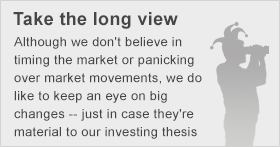Filed under: Investing
On March 14, messaging app Weibo filed to raise $500 million via a U.S. initial public offering. Weibo, provided by Sina , is a microblogging service similar to Twitter , which boasts roughly 130 million monthly active users.
The long-awaited offering will finally allow Sina, which has a 77% stake, to spin off Weibo as a new company. E-commerce giant Alibaba Group, which is likely to increase its stake in Weibo to 30%, is another winner. As one of the most popular social networks in the world's second-largest economy, Weibo generated $188 million in revenue in 2013, mostly through advertising. What's next for Weibo after its IPO?

Source: Weibo Corporation, F1.
A mix of Facebook and Twitter
Launched in 2009, Weibo is a mix of Facebook and Twitter. Like Twitter, users are able to post messages with 140 characters. However, because users usually post messages in Chinese, they are able to express more ideas, as 140 Chinese characters amount to approximately 70-80 English words. Like Facebook, Weibo has plenty of social features. The design looks like a social network, and the service supports rich media. Weibo's message stream actually looks a lot more like a Facebook timeline than a Twitter feed.
The business
The company generates most of its revenue from advertising. Marketers see Weibo as a microcosm of Chinese society because the service is popular among a wide range of users, from ordinary citizens to celebrities. Weibo offers a wide range of advertising solutions, including social display ads and native ads. The service also provides traffic to several partners, including media outlets and game developers.
More than 400,000 businesses have opened Weibo enterprise accounts, which enable them to create personalized landing pages and use the platform to create brand awareness, launch new products, and manage customer relationships. Not surprisingly, one of the company's most important clients is Alibaba, which has helped Weibo launch a new payment platform called Weibo Payment.
The service has experienced rapid revenue growth. Top line increased from $65.9 million in 2012 to $188.3 million in 2013. Moreover, in the most recent quarter, Weibo became profitable.
The IPO
By going public this year, Weibo could benefit from a great IPO atmosphere in the U.S. Roughly 49 companies have filed for IPOs this year, and many other tech companies may also be considering going public.
With more than 600 million registered users and 129 million monthly active users, Weibo's IPO will likely be huge. Note that Weibo has roughly half the size of Twitter's monthly active user base, and it is targeting an $8 billion initial market valuation, well below Twitter's $30 billion current market capitalization.
Heavy dependence on advertising
Despite being one of the most popular social networks in China, Weibo's IPO is not risk-free. First, like Facebook, Weibo is heavily dependent on advertising. The company generated almost 80% of its total revenue from advertising and marketing services in 2013. Weibo has tried to diversify its business model by introducing game-related services and VIP membership in the past few quarters. However, it's too early to know if these new monetization strategies will succeed in generating significant revenue in the medium run.
Beware of hypercompetition
Note that the company is competing for traffic in a hypercompetitive market. There are hundreds of popular social networks in China, including WeChat, QQ Mobile, Kakao Talk, Douban, Yixin, and Renren. In particular, instant messaging app WeChat -- developed by Tencent Holdings -- is a strong competitor. The app reported 379% year-over-year growth in global users in 2013. Unlike Weibo, Tencent Holdings is targeting international markets for its WeChat app. According to Tencent's chief strategy officer, James Mitchell, the company spent up to $200 million last year on WeChat's overseas promotion.
Final Foolish takeaway
Weibo is going public at a good time for IPOs. The company, which just became profitable in the fourth quarter of 2013, has become one of the largest social networks in China, generating more than $180 million in revenue last year, mainly from advertising. With roughly half the size of Twitter's monthly active user base, Weibo is targeting an $8 billion initial market valuation. At first glance, the number looks high for a company that is barely profitable. However, $8 billion may not be too unrealistic, as Twitter's current market capitalization is roughly $30 billion. In this context, there's a high chance that Weibo's IPO will succeed, but risks related to hypercompetition and heavy dependence on advertising should not be ignored.
How can you separate risky investments like Weibo from better ones like Baidu?
Want to profit from the rise of Chinese Internet giants like Baidu, SINA, and Alibaba? The key is to recognize smart and steady investments with a critical eye. Those who wait on the sidelines are missing out on potentially massive gains.
The Motley Fool is offering a new special report, an essential guide to investing, which includes access to top stocks to buy now. Click here to get your free copy today.
The article What's Ahead for Weibo's IPO? originally appeared on Fool.com.
Adrian Campos has no position in any stocks mentioned. The Motley Fool recommends Sina and Twitter. The Motley Fool owns shares of Sina. Try any of our Foolish newsletter services free for 30 days. We Fools may not all hold the same opinions, but we all believe that considering a diverse range of insights makes us better investors. The Motley Fool has a disclosure policy.Copyright © 1995 - 2014 The Motley Fool, LLC. All rights reserved. The Motley Fool has a disclosure policy.
Read | Permalink | Email this | Linking Blogs | Comments



















